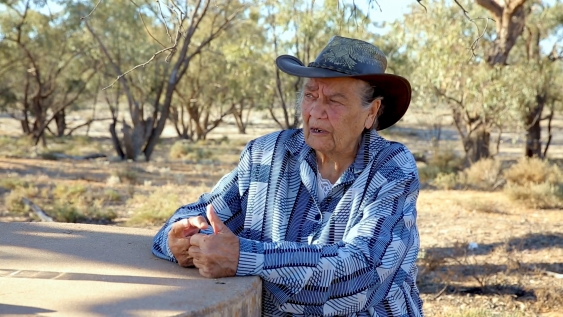A good yarn: Koori Elders talk about culture, Country and history
An oral history series documenting the experiences of 10 Aboriginal Elders will contribute Aboriginal voices and perspectives to primary education.
An oral history series documenting the experiences of 10 Aboriginal Elders will contribute Aboriginal voices and perspectives to primary education.

Aboriginal and Torres Strait Islander viewers are warned there are names, voices and images of deceased people in this video.
An oral histories project led by Scientia Associate Professor Fabri Blacklock from UNSW Sydney will give primary school students access to aspects of Aboriginal culture as told by Aboriginal Elders.
The project, Keeping Culture: Utilising Koori Elders wisdom and knowledge in education, documents the histories of five women and five men with a depth of knowledge across diverse sectors, including child protection, Aboriginal self-determination and environmental activism, academia and the arts.
The short video series, funded by an ARC Indigenous Discovery Grant, was recorded by A/Prof. Blacklock from UNSW and Professor Janet Mooney from the Australian Catholic University. The histories contribute to a critical gap in educational research on Aboriginal knowledges and perspectives.
“The project will enhance Aboriginal education in Australian schools and strengthen the identity, connection to culture and educational outcomes of all students,” says A/Prof. Blacklock, a Nucoorilma and Biripi woman from UNSW’s School of Art & Design. A/Prof. Blacklock is an artist, historian and curator whose research aims to improve educational equity and wellbeing for Aboriginal people. Her research is central to her identity as a Koori woman, privileging Aboriginal epistemologies and ontologies.
“Elders’ wisdom and knowledge, perspectives and experiences are the foundation and lifeblood of continuing Koori culture. This research is urgent to prevent the knowledge and wisdom they carry with them from being lost forever.”
The project draws on local Koori oral tradition, using Aboriginal research methodologies, such as yarning and deep listening.
“Yarning and deep listening are central to our connection to Country and culture and fostering our resilience through the continued colonisation of our people, land and culture,” A/Prof. Blacklock says.
Yarning circles – a group dialogue that aims to build collective connection – are gaining momentum within education and community organisations more broadly.
“Having a talk, having a yarn in a more informal way, rather than a traditional qualitative interview … is a really good way to have that two-way sharing between people, [promoting] multiple voices, and sharing and learning as mob.”
The Elders’ oral histories project plays an important role in the school curriculum through embedding Aboriginal knowledges within our education system.
“Learning from Aboriginal Elders as the senior knowledge holders and custodians of culture can improve students’ understanding of the history of Australia,” A/Prof. Blacklock says.
“Our education system is very Eurocentric and dominated by non-Aboriginal perspectives and experiences. I think it’s important that Aboriginal people have the space to tell our stories on our own terms.”
The Elders offer diverse perspectives on being Aboriginal in Australia. Influential people within their communities, they have collectively advocated for better conditions for Aboriginal people, including better community housing, a living wage, respect for Aboriginal protocols of kinship care, artmaking for wellbeing and traditional land rights.
“Culture is very, very important to Aboriginal people,” says Aunty Sue Blacklock OAM. “To know where you come from, to know that is to identify yourself as an Aboriginal and to be proud of who you are and where you come from.”
Aunty Sue lobbied for improved child welfare, kinship care and cultural sensitivity in Aboriginal child protection. She co-founded Winangay Resources, an Aboriginal-controlled non-government organisation dedicated to improving outcomes for Aboriginal children in out-of-home and kinship care.
“I wanted to see our kids come back home,” she says. “It’s very important to protect children and to keep them safe. I train carers and workers about kinship, to get out there and find their kids’ families … to stop the tears and heartaches in our community.”
The oral histories project will have significant impact on Aboriginal peoples’ wellbeing through its transmission of culture and its cataloguing of insights and cultural information.
“Connecting young and old together as well is really important,” says A/Prof. Blacklock. “A lot of young fellas are becoming disconnected from culture and from our Elders… It's really important to have that reconnection.”
“Having the opportunity to share his close connection to country and culture with future generations is vital,” says Uncle Bud. Reconciliation pivots around respect for one another, that’s what his grandfathers and uncles taught him.
“Black and white, we’re all one. That’s what I tell the kids. Don’t care about the colour of your skin, we’re all the same. We all bleed the same and everything. Since the old fellas have gone, I just want to get the younger generation together. That’s the most important thing, I reckon,” he says.
The oral histories are further supported by historical and contemporary records, photographs, artworks and commentary, for social context. The materials will be used as educational resources for both NSW school and Aboriginal community education.
“The most empowering part of recording the oral histories is that they tell the personal perspectives and experiences of Aboriginal people,” says A/Prof. Blacklock. “Listening to some of the stories and experiences that the Elders told me, I’ve had the hairs on my arm stand up and wanted to cry at some points.
“They're so resilient, and they're so strong, and some of them have been through horrific experiences, but they're still standing today and they're still fighting to make change in our communities.”
Watch the full video series on YouTube via this link.